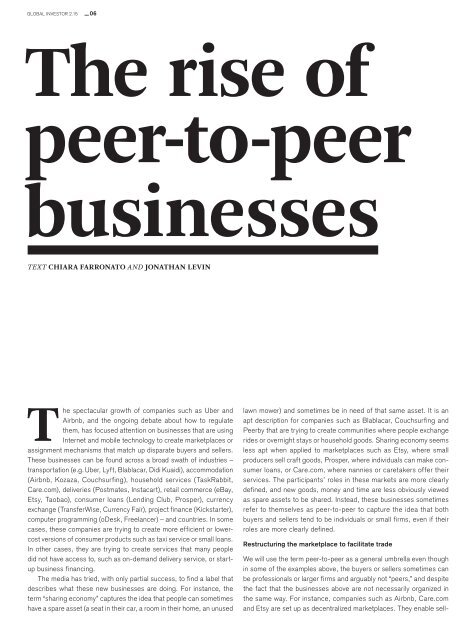The sharing economy
New opportunities, new questions Global Investor, 02/2015 Credit Suisse
New opportunities, new questions
Global Investor, 02/2015
Credit Suisse
You also want an ePaper? Increase the reach of your titles
YUMPU automatically turns print PDFs into web optimized ePapers that Google loves.
GLOBAL INVESTOR 2.15 — 06<br />
<strong>The</strong> rise of<br />
peer-to-peer<br />
businesses<br />
TEXT CHIARA FARRONATO AND JONATHAN LEVIN<br />
he spectacular growth of companies such as Uber and<br />
Airbnb, and the ongoing debate about how to regulate<br />
them, has focused attention on businesses that are using<br />
Internet and mobile technology to create marketplaces or<br />
assignment mechanisms that match up disparate buyers and sellers.<br />
<strong>The</strong>se businesses can be found across a broad swath of industries –<br />
transportation (e.g. Uber, Lyft, Blablacar, Didi Kuaidi), accommodation<br />
(Airbnb, Kozaza, Couchsurfing), household services (TaskRabbit,<br />
Care.com), deliveries (Postmates, Instacart), retail commerce (eBay,<br />
Etsy, Taobao), consumer loans (Lending Club, Prosper), currency<br />
exchange (TransferWise, Currency Fair), project finance (Kickstarter),<br />
computer programming (oDesk, Freelancer) – and countries. In some<br />
cases, these companies are trying to create more efficient or lowercost<br />
versions of consumer products such as taxi service or small loans.<br />
In other cases, they are trying to create services that many people<br />
did not have access to, such as on-demand delivery service, or startup<br />
business financing.<br />
<strong>The</strong> media has tried, with only partial success, to find a label that<br />
describes what these new businesses are doing. For instance, the<br />
term “<strong>sharing</strong> <strong>economy</strong>” captures the idea that people can sometimes<br />
have a spare asset (a seat in their car, a room in their home, an unused<br />
lawn mower) and sometimes be in need of that same asset. It is an<br />
apt description for companies such as Blablacar, Couchsurfing and<br />
Peerby that are trying to create communities where people exchange<br />
rides or overnight stays or household goods. Sharing <strong>economy</strong> seems<br />
less apt when applied to marketplaces such as Etsy, where small<br />
producers sell craft goods, Prosper, where individuals can make consumer<br />
loans, or Care.com, where nannies or caretakers offer their<br />
services. <strong>The</strong> participants’ roles in these markets are more clearly<br />
defined, and new goods, money and time are less obviously viewed<br />
as spare assets to be shared. Instead, these businesses sometimes<br />
refer to themselves as peer-to-peer to capture the idea that both<br />
buyers and sellers tend to be individuals or small firms, even if their<br />
roles are more clearly defined.<br />
Restructuring the marketplace to facilitate trade<br />
We will use the term peer-to-peer as a general umbrella even though<br />
in some of the examples above, the buyers or sellers sometimes can<br />
be professionals or larger firms and arguably not “peers,” and despite<br />
the fact that the businesses above are not necessarily organized in<br />
the same way. For instance, companies such as Airbnb, Care.com<br />
and Etsy are set up as decentralized marketplaces. <strong>The</strong>y enable sell-

















